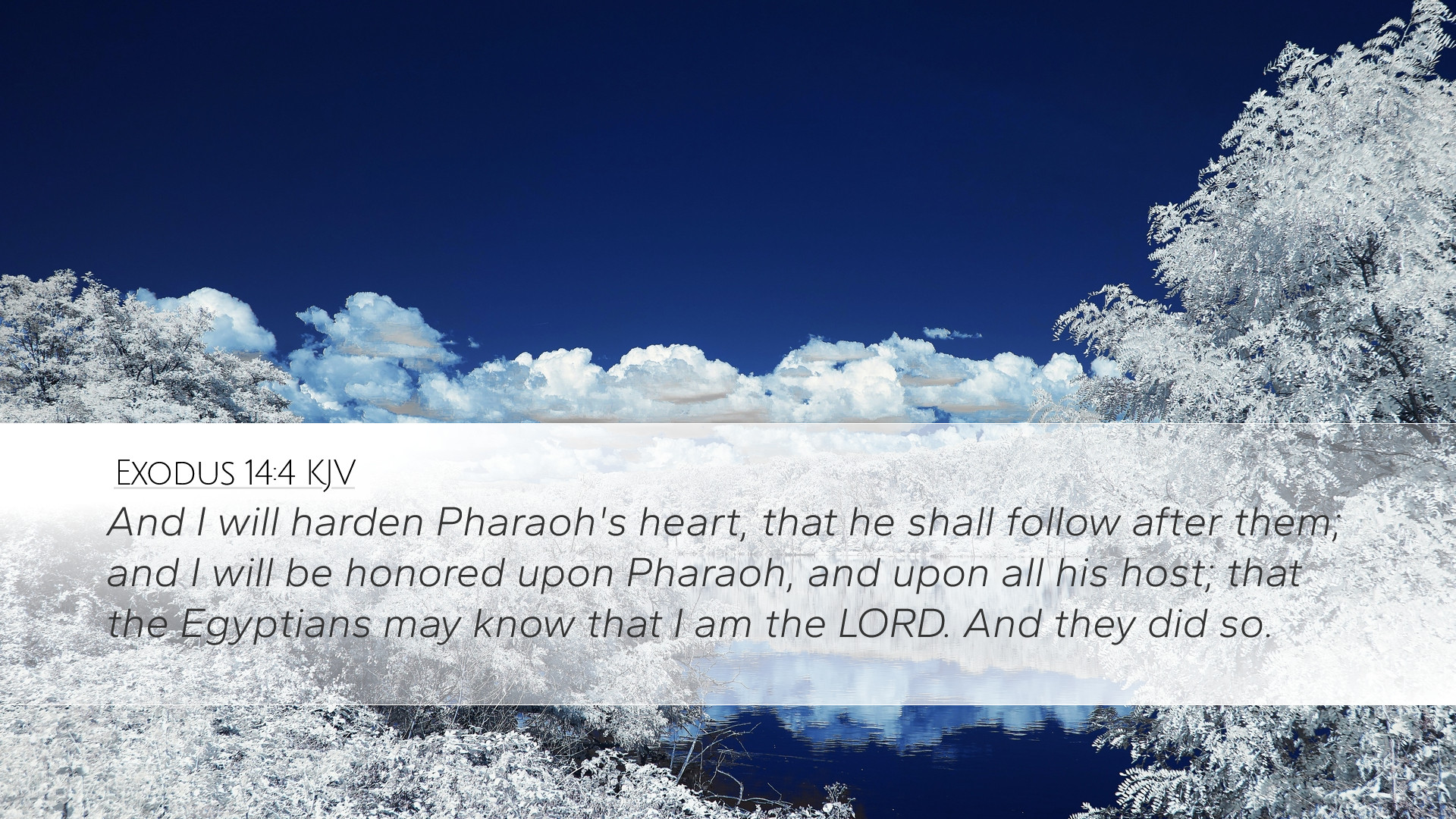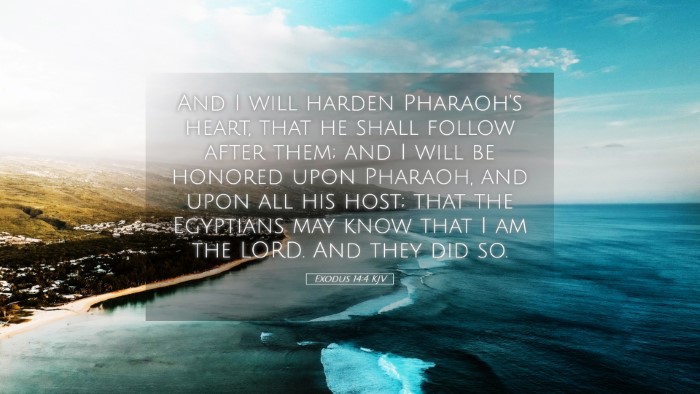Commentary on Exodus 14:4
Bible Verse: Exodus 14:4 - "And I will harden Pharaoh's heart, and he shall follow after them; and I will be honored upon Pharaoh, and upon all his host; that the Egyptians may know that I am the LORD. And they did so."
Introduction
This passage is pivotal within the narrative of the Exodus, signaling a dramatic moment where God reveals both His sovereignty and purpose in the liberation of Israel from Egyptian bondage. The decision to harden Pharaoh's heart indicates a divine orchestration of events which serves as a profound lesson in divine justice, mercy, and the revelation of God's glory.
Theological Implications
God's assertion of hardening Pharaoh’s heart can be perplexing. However, public domain commentaries elucidate this act not as an arbitrary decision but as a means for God to display His power and authority. As Matthew Henry notes, this hardening is consequential to Pharaoh's own stubbornness and refusal to heed the warnings of God. God’s sovereignty operates not only in deliverance but also in judgment, emphasizing how divine providence interweaves with human decisions.
Matthew Henry Insight
Matthew Henry emphasizes the purpose behind hardening Pharaoh’s heart, showing it was to demonstrate God's glory. The phrase "I will be honored upon Pharaoh" signifies that God allows events to unfold in such a manner that His power and holiness are manifest not only to Israel but to the Egyptians as well. This serves a dual purpose: for Israel, it is an assurance of divine intervention; for Egypt, it reveals the futility of idolatry and the true nature of God.
Albert Barnes Reflection
Albert Barnes, reflecting on this verse, discusses the moral implications of having a hardened heart. He notes that it reflects a state of rebellion against God—a condition that Pharaoh exemplifies. By choosing to defy God, Pharaoh becomes an unwitting instrument in God's plan to demonstrate His sovereignty. Barnes articulates that God's hardening and Pharaoh’s stubbornness work in a way to portray a broader theological narrative that explores the human condition when facing divine authority.
Adam Clarke’s Commentary
Adam Clarke provides additional understanding by highlighting the notion of God's sovereignty over nations. He explains that God's action in hardening Pharaoh's heart is not merely punitive but intended to highlight God's ultimate plan and purposes. Clarke also discusses the historical context, noting that this event was meant to establish Israel as a nation under God’s providence and to permanently mark the distinction between His people and the oppressive powers of the world.
Historical Context
The act of crossing the Red Sea is a central event in Jewish and Christian tradition. Understanding this moment within its historical and cultural context deepens its significance. The Egyptians held belief in many gods, and the ultimate subjugation of Pharaoh signifies a powerful declaration against these false deities. Henry comments on how this supreme act of God demonstrates His supremacy over all that challenges His authority.
God’s Purpose Revealed
In Exodus 14:4, God communicates His intent: “that the Egyptians may know that I am the LORD.” This phrase is crucial, as it underscores the evangelistic aspect of Israel's deliverance—God desires that all nations recognize His dominion. This idea presents a major theme throughout Scripture where God's actions are not only for the benefit of His people but also for the revelation of His nature to all of humanity.
Conclusion
The examination of Exodus 14:4 through the lens of public domain commentaries reveals a multifaceted understanding of divine sovereignty and human responsibility. Pastors, students, theologians, and scholars should take away the recognition that God’s hardening of Pharaoh’s heart demonstrates His ultimate authority and His desire for the world to know Him. Through this event, God establishes a narrative of redemption that resonates throughout Scripture, ultimately culminating in the revelation of Christ, who fulfills God's promise of deliverance.
Key Takeaways
- God’s Sovereignty: God demonstrates control over both human hearts and historical events.
- Divine Glory: God’s acts serve to reveal His character and righteousness to nations.
- Human Responsibility: Pharaoh’s decisions serve as a warning against hardening one’s heart against God.
- Historical Revelation: The narratives of the Old Testament lay the groundwork for understanding God’s ultimate plan through Christ.


